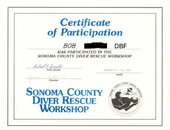You should start by creating a list of 20 or so near-missess. Accidents that did not lead to drowning. And discuss those in a group meeting. There is no mystery to diving accidents (at least to the person that dies) it is in 95 percent an addition of several very simple factors. A true rescue diver thinks and plans diving to avoid any need of rescue. I am a public safety diver, now in reserve, and I can tell you that the rescue scenarios that we were active in were recoveries. By the time you sound the alert, it is usually too late.
What you should concentrate on is working on proper team diving, proper dive planning and work through the scenarios that you are likely to encounter where you dive - is it silt (proper buoyancy), tired diver tow due to currents or surf, buddy separation, etc etc. Life is not tv, if you have to look for a missing diver on the bottom, you are probably not bringing them back alive.
Practice the skills you will actually need -and discuss in the group what they are.
Now for instructors and assistants we routinely hold group exercises targeted towards out of water extractions, CPR and search. Should this be on your priority list? CPR, yes, as you never know when you will need to use it, and it does save lives.
As for underwater search for missing diver- I would put it so much further down the list than group diving skills, dive technique, gear and dive planning and surface support....
An example of three real-life accidents that a rescue diver (whether certified officially or not) could easily avoid and that would be classified as "death by drowning" if the involved were not very lucky....
scenario 1 - diver dives with a new ice hood (small mouth opening), does not do shallow training dive with new piece of gear, decides to play cool tech diver without proper training, so when his buddy experiences a freeflow, takes out his reg out of mouth to donate primary (det is wat dem cool cave divers do) but cannot switch to his secondary (octopus) due to mouth opening on ice hood being too small. Free emergency ascent from 12 meters, abandoned buddy.
scenario 2 - 3d world country, diver of vacation, does not have a buddy, faulty regulator. But damn it, I paid for this here vacation. So the kind captain on de boat bangs my reg till it stops hissing on the surface. Surprise, regulator catastrophically freeflows at 20 meters on second dive, dumps air in 3 minutes, emergency ascent in strong current. 2 hour recovery by boat. But he did not want to miss the dive!
scenario 3 - diver dives in new waters without check dive for weighting, too much weight, drysuit squeeze, overinflation, pop to the surface, chamber trip.
This is all real life... What is better for a rescue diver, to discuss such errors and perhaps train to have the courage to speak to divers that are showing lack of diving experience, or to think that as a rescue diver your primary job is to search for missing divers on the bottom, with the aquaman soundtrack playing in the background...




